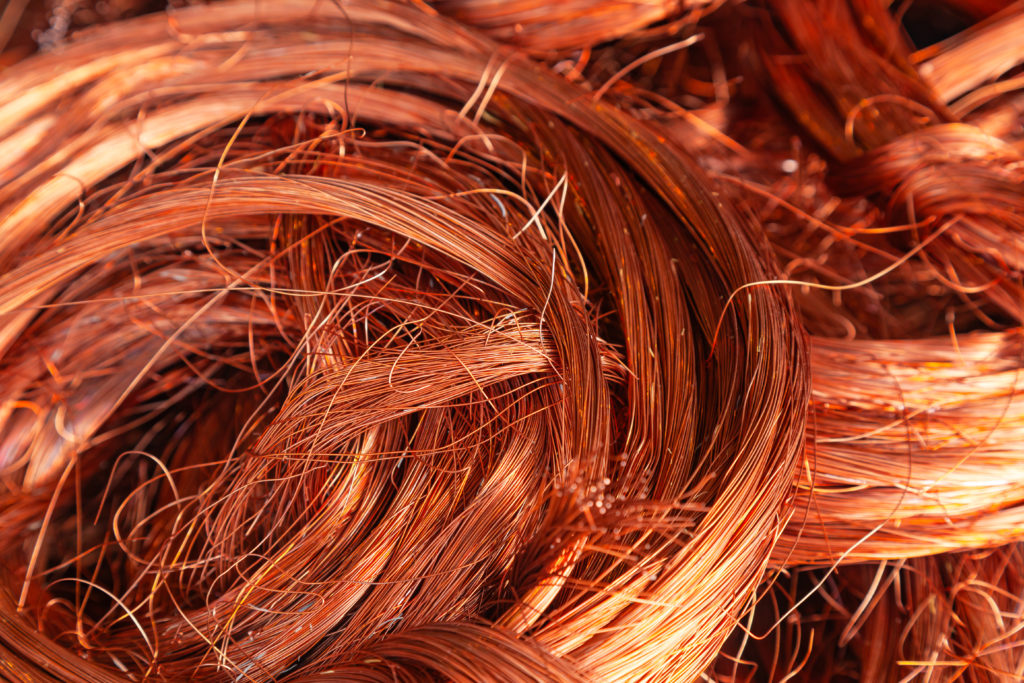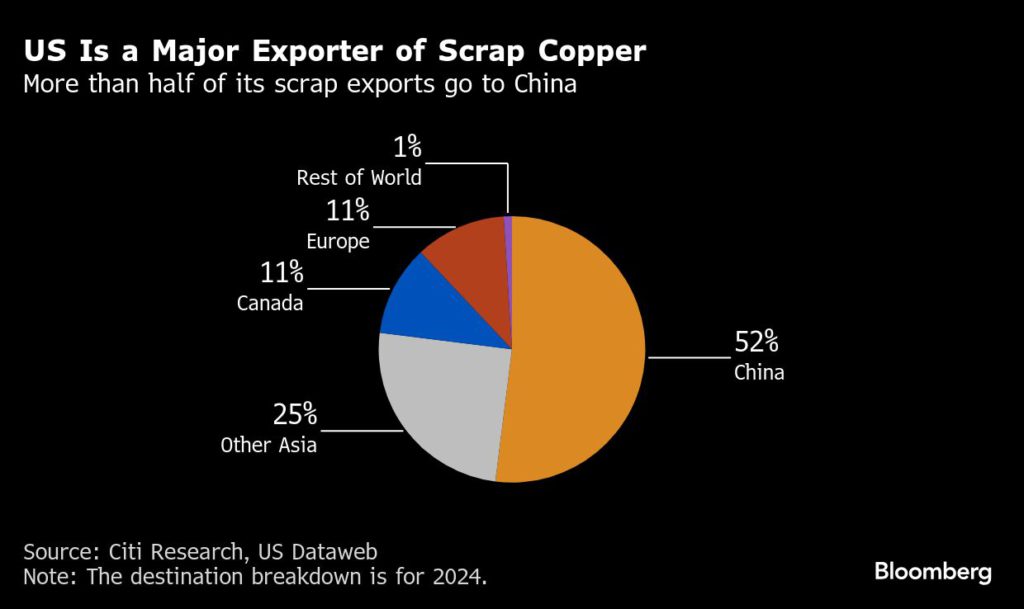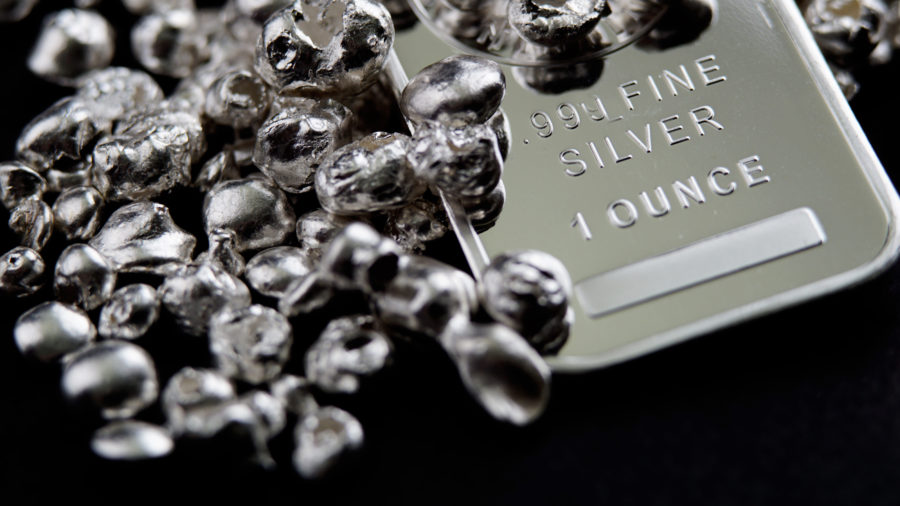US copper industry seeks export curbs instead of tariffs

Major players in the US copper industry have called on President Donald Trump to restrict exports of ore and scrap metal rather than imposing tariffs on imports, in his efforts to boost domestic production.
Trump’s executive order in February ordering a probe into possible copper tariffs upended the global market, driving US prices to a huge premium over international benchmarks and spurring a global race to get copper into the country before any potential tariffs are imposed.
The order called on US commerce secretary to initiate an investigation under section 232 of the Trade Expansion Act and make recommendations on actions “including potential tariffs, export controls, or incentives to increase domestic production.”
In public comments in response to the probe, leading companies including miner Rio Tinto Group, fabricator Southwire Co. and trader Trafigura Group suggested that the administration should instead impose restrictions on exports of copper rather than tariffs on imports.
“The Trump administration should consider implementing export restrictions on domestically produced copper concentrate and copper scrap,” Rio Tinto wrote, while Southwire, the US’s largest manufacturer of copper wire, said: “The administration should focus on regulatory reform and restrictions on US copper exports as the primary tools to grow the US industry.”
Imposing export restrictions has the potential to trigger an upheaval to global copper markets. The US has been the top exporter of scrap to China, where smelters are suffering a shortage of semi-processed ore, called concentrate. On the flip side, currently operating US smelters are unable to process all domestically produced concentrate — a lack of processing capacity that makes the US a significant importer of refined copper metal.
Scrap copper
To be sure, the industry’s latest lobbying push doesn’t mean the Trump administration will heed its calls. Still, any serious curbs on US scrap supplies would redraw the market for scrap, which accounts for almost a third of copper supply. US shipments of waste copper were about 600,000 tons last year, according to research from Citigroup Inc. — an amount equivalent to some of the world’s largest copper mines. More than half of that goes directly to China for processing.

If the US goes down the export curb route, that’ll lead to a tighter scrap market, and in turn more pressure on Chinese smelters, said Ryan McKay, senior commodity strategist at TD Securities. “Generally it would lead to tighter refined supply and drawing inventory.”
While several responses called for the US to impose restrictions on exports of copper scrap, and in some cases copper concentrates, many urged the administration not to place import tariffs on copper metal.
The Copper Development Association, the trade group for the US industry, called for exemptions from import tariffs for raw materials “including refined copper cathodes and scrap copper.”
Trafigura, the world’s largest copper trader, argued that import tariffs should be imposed on manufactured copper products like wire rod, tube and strip, but that the administration should “keep refined copper imports free from tariffs for now, until new mining and smelting capacity has been constructed.”
US copper producer Freeport-McMoRan Inc. didn’t make any direct recommendation about tariffs, but argued the US should support free trade.
“In 2024, the US imported approximately 50% of its copper cathode demand from Chile, Canada, Peru and other countries, which is necessary to meet current demand because there is no US latent production capacity,” the company wrote. “Promoting free and fair trade with US allies will ensure US copper supply requirements are satisfied.”
The industry responses included a range of other suggestions for boosting the US copper sector, including introducing tax credits, streamlining the permitting process for new mines, and imposing tariffs on imports of semi-fabricated products containing copper.
Several respondents highlighted the challenge of incentivizing investments into new US smelting capacity. There are only three copper smelters in the US, and one of them is the mothballed Hayden plant in Arizona. In its submission, Asarco LLC, which owns the Hayden plant, asked for emissions testing requirements to be relaxed to allow the facility to reopen.
Copper premium
Industry recommendations for copper export controls aren’t new. In 2004, the Copper & Brass Fabricators Council and Non-Ferrous Founders’ Society filed a petition to the Commerce Department requesting an imposition of copper scrap export controls, complaining that large exports were causing artificially high prices for domestic consumers of scrap. The petition ultimately failed, with Commerce saying the global market demand for raw copper was the most important factor on the changes in domestic copper scrap prices.
Not everyone in the US copper industry is seeking export curbs, most notably the Recycled Materials Association that represents the vast majority of American copper scrap companies. The group said the administration shouldn’t consider restrictions on recycled copper exports, noting the abundant supply of US copper scrap allows it to meet domestic needs and sell overflow abroad.
The threat of tariffs has pushed US copper prices to large premiums to international benchmarks as traders bet that the president would impose tariffs of as much as 25% on copper imports. While still large by historical standards, the premium has decreased in the past few weeks in a possible reflection of the unpredictability of Trump’s tariff policies.
In late March, for example, Comex copper for December delivery was trading as much as 20% above similar future contracts on the London Metal Exchange. As of Tuesday, that premium had narrowed to around 14%.
The copper industry recommendations are “a reflection of globalization breaking down, and countries and regions running protectionist policies in securing critical metals and minerals,” said Nicky Shiels, head of research and metals strategy at MKS Pamp SA. “Global prices are behind us.”
(By Jack Farchy and Julian Luk)
More News
{{ commodity.name }}
{{ post.title }}
{{ post.date }}




Comments